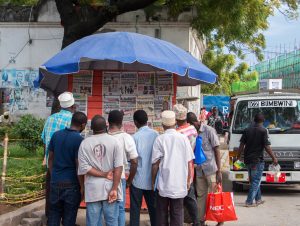In 2014, during the Central Conference on Work Relating to Foreign Affairs in Beijing, Chinese President Xi Jinping advocated for strengthening China’s soft power globally by improving how the country communicates its message. In the subsequent years, Chinese state-controlled media focused on cultural investments and international cooperation, establishing marketing networks and expanding the reach of quality cultural assets abroad, particularly in Africa.
China has built narratives to its advantage in a region that has increasingly become a theater of great power rivalry, amid what The Economist has termed as “The New Scramble for Africa.”
China’s African Outreach
China’s information campaigns in Africa are subtle, focusing on economic issues and promoting a positive narrative around its investments, mainly of the Belt and Road Initiative. State-controlled media outlets like Xinhua, China Daily, China Radio International (CRI), and CGTN (formerly CCTV International) play a vital role in this narrative.
Meanwhile, StarTimes, a Chinese-owned media company, has become Africa’s second-largest digital TV provider, with over 13 million digital TV and 20 million streaming subscribers. It has invested over $2 billion in digital TV infrastructure across 30 African countries.
Additionally, China actively produces documentaries to enhance its soft power. For instance, the docuseries “Bobby’s Factory” focuses on a Chinese factory owner in Africa and his positive interactions with local workers. Another series, “TAZARA: A Journey without an End” highlighted the Tanzania-Zambia Railway (TAZARA) project, a symbol of China-Africa cooperation, under the larger umbrella of BRI. Similarly, “My China Story” features Africans sharing positive experiences from their time in China, further shaping a favorable image of the country among younger generations.
China’s Information Strategy in Africa
China has adopted a three-pronged strategy in its information campaign in Africa. First, it hosts and trains numerous African media professionals each year, teaching them to promote Chinese investments as a positive force.
Second, China invests in local African media outlets, influencing their editorial practices to align with the Chinese narrative. For example, StarTimes formed a joint venture with the Zambia National Broadcasting Corporation (ZNBC), securing a majority stake.
Finally, China sells technology to African governments that enables tighter control over digital information, including blocking websites and shutting down internet access. During the 2020 Tigray Conflict in Ethiopia, for instance, Ethio Telecom used technology and expertise from Chinese firms like Huawei and ZTE to suppress dissent and limit information flow.
Chinese content frequently downplays local criticisms of its projects, such as labor disputes, environmental issues, and debt concerns, leading to a distorted view of Sino-African relations. Chinese media coverage can also shape perceptions of political candidates during election campaigns. During Zambia’s 2016 elections, Chinese-owned and local media outlets portrayed Chinese investments as beneficial to Zambia’s future economy, favoring pro-China candidate Edgar Lungu.
In Kenya’s 2017 elections, China’s increasing role as an infrastructure financier was prominently featured. CGTN Africa portrayed the erstwhile President Uhuru Kenyatta as a symbol of modernity and progress, stressing his consent for projects like the Standard Gauge Railway while overlooking public concerns about sustainability and costs and minimizing opposition critiques. In Zimbabwe, China has actively supported the ZANU-PF Political Party by restricting civil society movements and opposition and advancing narratives favorable to China’s interests in politics and business.
In order to support Chinese companies’ contracts and trade agreements, China also generates new narratives. Angola, a major oil producer, has received substantial Chinese infrastructure loans in exchange for future oil exports to China. Chinese media have framed these infrastructure projects as “infrastructure-for-oil,” portraying them as vital for Angola’s recovery after decades of Civil War. This strategy has ultimately enabled China to gain long-term access to Angola’s oil reserves at favorable prices.
Similar tactics were observed in Zambia, where the China Nonferrous Metal Mining Company (CNMC) secured a significant stake in Zambian copper mines, aided by favorable media coverage that overlooked labor issues and environmental concerns. Similarly, China established a presence at Djibouti’s Doraleh Multipurpose Port as part of its Belt and Road Initiative, downplaying worries about Djibouti’s increasing reliance on Chinese loans.
Other strategically important projects, such as Uganda’s Entebbe International Airport and Ethiopia’s Addis Ababa-Djibouti Railway, allowed China to reap significant economic and geopolitical advantages. Chinese media coverage of these projects undermined debt concerns and promoted a pro-China narrative.
China’s Media Influence Under Scrutiny
Local perceptions are evolving as more and more African nations speak out against the adverse consequences of Chinese narrative-building. Hakainde Hichilema, the president of Zambia, has voiced worries about the growing influence of foreign countries in the media, citing China in particular in shaping narratives and favoring specific perspectives. Similarly, Oby Ezekwesili, a former politician from Nigeria who is currently vice president of the World Bank Africa, has raised concerns that Chinese investments and loans are frequently presented in an unduly flattering light. Ezekwesili has questioned the lack of transparency in contracts granted to Chinese enterprises and alleged significant narrative control by Chinese-backed media.
Concerns regarding Chinese-owned social media apps like TikTok are also growing because they are conceived to be susceptible to politically driven behavior. Several nations, like Senegal and Somalia, formally prohibited the app in 2023, claiming security and moral concerns. In other countries, including in South Africa and Kenya, civil society groups have petitioned against WeChat and TikTok, among other apps.
The Battle for African Narratives
China’s investments in the African media landscape influence access to information and shape key narratives, although the impact of Chinese messaging remains mixed. Officials within African regimes are often more receptive to China’s governance model and messaging. However, ordinary Africans face the brunt of this narrative battle, in which they are inundated with conflicting misinformation designed to sway public opinion and erode societal cohesiveness. There is an urgent need for awareness campaigns to educate these politicians about the long-term risks to their sovereignty.
A version of this article was previously published by the Observer Research Foundation (ORF).

































